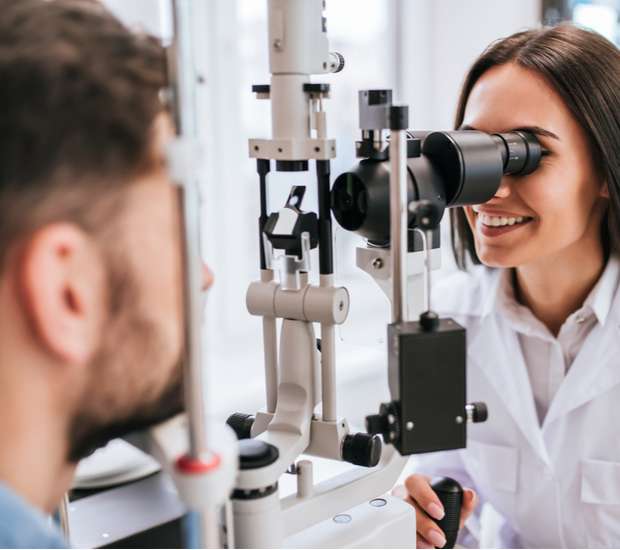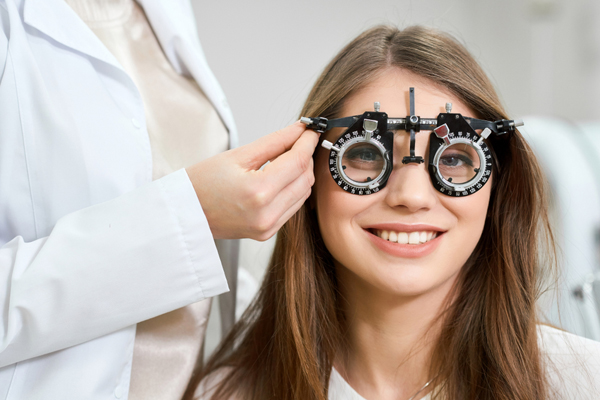How Often Should I Have an Eye Exam?

While most people know to visit the dentist twice a year and the family doctor on an annual basis, many do not think to schedule an eye exam. In fact, most people only consider visiting an eye doctor if and when their vision begins to deteriorate. That said, eye exams are an essential aspect of a person's overall health. These assessments help to detect vision problems in the early stages, when most treatable. Regular exams can also help to correct or adapt to vision changes so the patient can continue to live a comfortable and fulfilling life.
When to get an eye exam, by age
How often a person should undergo an eye exam is dependent upon a number of factors. Age, overall health and risk factors all play a role in the development of vision problems. Generally speaking, there are certain guidelines which all individuals should follow.
Babies and toddlers
Pediatricians try to perform eye assessments on patients when they are still fairly young. Many children undergo the first eye test as young as one year old. Pediatricians perform these tests to check for common eye conditions that typically develop early in life such as crossed eyes, lazy eyes and misaligned eyes. If the test results reveal an issue or if the pediatrician notices symptoms suggestive of an eye condition, the doctor may recommend that the child undergo more comprehensive testing.
School-aged children and teens
As children age, it becomes easier to discern whether a vision problem exists. For instance, a young child may perform poorly in school despite demonstrating a strong capacity to retain information. A teen might complain of regular headaches. If a child or teen exhibits any symptoms of vision problems, an eye exam may be in order. This is also true if there exists a family history of certain eye conditions such as farsightedness, nearsightedness or vision loss.
If a child or teen has diabetes, regular eye exams are also recommended. Diabetes is one of the most common causes of vision loss.
Adults
How often adults should undergo eye exams varies. Adults who have no history of vision problems and are fairly healthy should follow this schedule for exams:
- Every five to 10 years between ages 20 and 30
- Every two to four years between ages 40 and 54
- Every one to three years between ages 55 and 64
- Every one to two years after age 65
That said, if an adult of any age wears glasses or contact lenses, eye doctors recommend more regular eye exams. "Regular" means exams every one to two years. If there is a family history of vision loss or eye disease or if a person has a chronic disease that puts them at risk of vision loss, they should also undergo routine exams.
Other risk factors that may call for an increased frequency of eye exams include taking medications that have visual-related side effects and working in an occupation that strains the eyes. A previous eye injury is also a risk factor for vision problems.
Conclusion
Vision problems can significantly affect the quality of one's life. For this reason, a person should undergo an eye exam at the recommended intervals to catch any problems early.
Request an appointment here: http://brighteyesmv.com or call Bright Eyes Optometry at (914) 668-1429 for an appointment in our Mt Vernon office.
Check out what others are saying about our services on Yelp: Read our Yelp reviews.
Recent Posts
Emergency eye care is needed if you find yourself dealing with a problem with your eye that causes pain or affects your vision. Failing to treat eye injuries as soon as they are detected can lead to permanent consequences, like reduced vision or blindness. Common eye injuries that require emergency eye care include: Exposure to…
Looking for more information on eye protection? An ophthalmologist knows everything there is to know about protecting the eyes. While there are a few different types of eye care professionals, ophthalmologists are eye care professionals who have undergone additional years of education and training so they can offer their patients both medical and surgical eye…
Controlling myopia at an early age can slow down its progression. This can help prevent yearly upgrades for stronger glasses. Your optometrist can help by offering various treatments. If you want to find out how your optometrist can help control myopia, here are the details.Optometrists use atropine eye drops to achieve short-term myopia control results.…
Another word for an itchy eye is ocular pruritis. It is a common health situation in many people. Itchiness in your eyes is more than enough reason to see an optometrist. Receiving prompt treatment is important in receiving prompt relief. If you want to know what causes an itchy eye and the treatments for it,…



